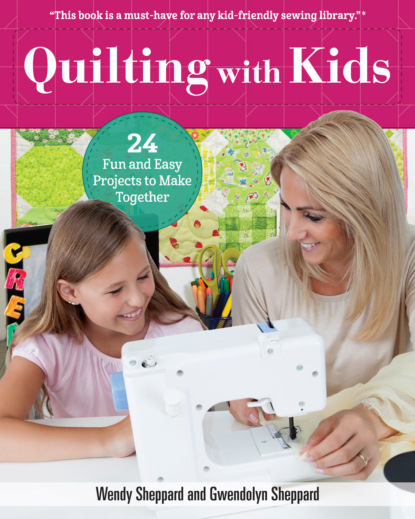collection of sewing supplies takes time, though. Here are a few of the basic things you’ll need to get started.
There are so many sewing notions available that it may seem overwhelming to the beginner. My advice is to start with the basics and remember that it takes time to build a collection.
Safety First
Here are a few of the most important things that I remind Gwen all the time:
■ Always place scissors on a hard surface like a table. Do not use them on chairs, couches, or the floor (especially a carpeted floor).
■ Always steer clear of the iron or ironing board.
■ When using the iron, do not leave the iron facing downward after use. Prop it up on its flat end to avoid burning your fabrics.
■ Sewing tools are not toys!
■ Fabric scissors are only for cutting fabrics. Once they are used on paper, they will become dull and will not cut through fabric anymore.
Sewing Tools
Always exercise care when working with sewing tools around children. Teach and emphasize safety issues when it comes to scissors, pins, needles, rotary cutters, and sewing machines. You should also supervise whenever the tools are used by children. It’s a good idea to teach kids to put back the tools once they’re done with them to minimize risk of injury (not to mention, tools will be easy to locate the next time they are needed).
Basic tools you’ll need:
■ Good lighting (not pictured)
■ Cutting mat—self-healing is preferable (not pictured)
■ Ruler (not pictured)
To-Do List
Here is a list of things to keep in mind before beginning each project you and your child work on together. Please note that, depending on age, skill, and maturity level, the child may be able to do some tasks assigned under the “Adult” column. Always keep safety issues in mind and supervise your child at all times.
| Adult | Child |
| Gather all supplies as listed (including basic sewing notions). | When sewing on a machine, be careful to gently guide the fabric with your hand, but never too close to the needle. Use a slower machine speed. |
| Exercise caution when cutting with a rotary cutter. Always alert children to its presence and remind them it’s not a toy; it’s a useful but somewhat dangerous tool. | When sewing pinned pieces, remove pins when your stitches get near them. Take the time to stick them back into your pincushion before you continue sewing. |
| Explain the difference between straight and zigzag stitches, and remind your child to change the sewing feet for each type of sewing. | Learn to secure stitches at the beginning and end of stitching by either reverse stitching or engaging the stitch secure function on the sewing machine (if available). |
| Pay attention to when you need to change sewing feet and stitch settings. |
SEWING MACHINE ... OR A PAIR OF HANDS!
I’ve found that using a sewing machine designed for a child can lead to frustration for everyone, so teach them to use your sewing machine instead. There is nothing more deflating to an excited child than having to stop for the adult to figure out machine issues! Gwen enjoys it much more when she’s sewing on my machine, with me right there to lend a hand whenever she needs one. Sharing your machine familiarizes your child with using a real machine and saves you money since you don’t have to buy them their own.
For machine sewing, you’ll need:
■ Machine needles (not pictured)
■ Patchwork pins (not pictured)
For hand sewing, you’ll need:
Конец ознакомительного фрагмента.
Текст предоставлен ООО «ЛитРес».
Прочитайте эту книгу целиком, купив полную легальную версию на ЛитРес.
Безопасно оплатить книгу можно банковской картой Visa, MasterCard, Maestro, со счета мобильного телефона, с платежного терминала, в салоне МТС или Связной, через PayPal, WebMoney, Яндекс.Деньги, QIWI Кошелек, бонусными картами или другим удобным Вам способом.
